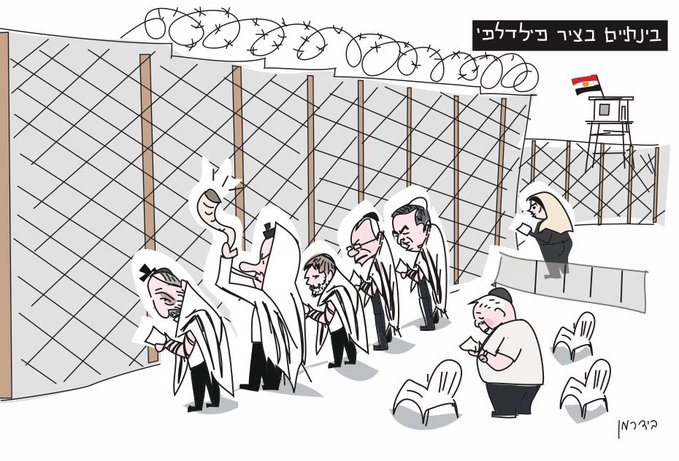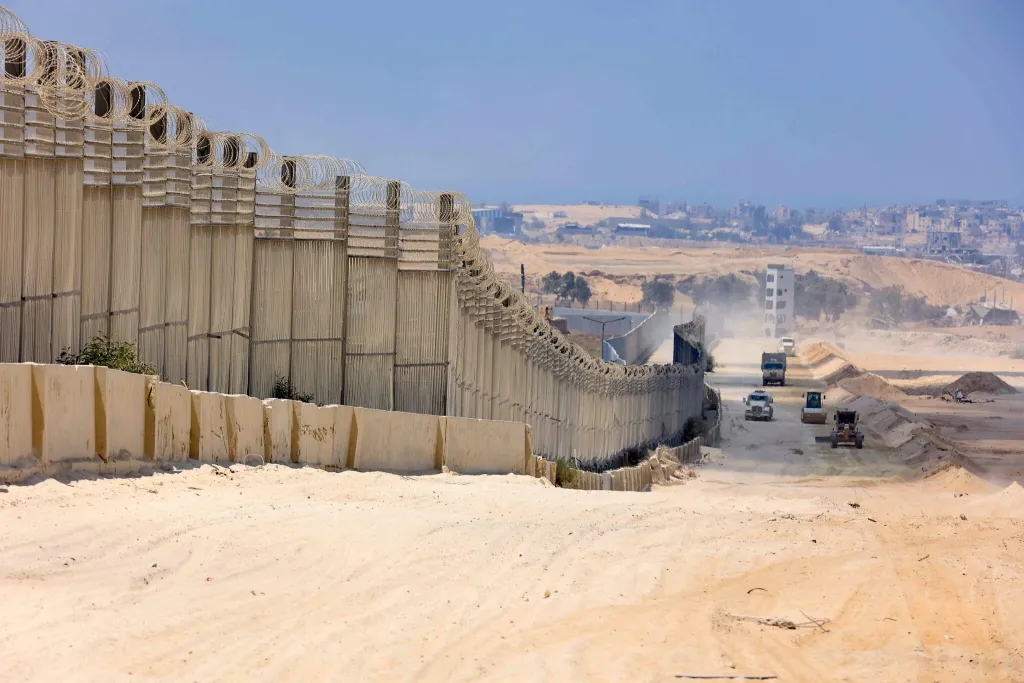GAZA, (PIC)
The Salah al-Din Corridor, also known as the “Philadelphi Route,” has recently become a focal point in the news due to its connection with the ongoing negotiations between the resistance and Israel. Netanyahu insists on keeping Israeli forces in the corridor as a condition for completing the deal, while Hamas demands the withdrawal of these forces.
The importance of this corridor lies in its strategic location along the border between Egypt and Palestine, south of Rafah. This prompted the Israeli military to reoccupy it several months ago, citing the claim to prevent weapons from reaching the resistance from Egypt.
The story of the Salah al-Din Corridor
The Salah al-Din Corridor refers to the border strip between Egypt and the Gaza Strip, extending from the Mediterranean Sea to the Kerem Shalom crossing. It is about 14 kilometers long and a few hundred meters wide, situated within the “D” buffer zone established under the Camp David Accords signed between Egypt and Israel in 1979.
In September 2005, Israel and Egypt signed the “Philadelphi Agreement,” which Israel considers a security annex to the peace treaty, governed by its general principles and provisions. This followed Israel’s withdrawal of its forces from Gaza under the “Disengagement Plan.”
The agreement allowed for the deployment of around 750 Egyptian soldiers along the border with Gaza to combat terrorism, prevent infiltration and smuggling, and detect tunnels. It also permitted a limited Israeli military presence consisting of four infantry battalions, field fortifications, and UN observers.
After the events of 2007, the border remained under the protection of Palestinian National Security, while Israel imposed a tight blockade on Gaza.
Israel reoccupied the Salah al-Din Corridor last May as part of its ongoing genocidal campaign against Gaza. The occupation forces have since strengthened their presence and paved the corridor.
Earlier this month, Netanyahu declared that Israel would not withdraw its forces from the Salah al-Din Corridor, claiming it to be a lifeline for Hamas. “We are staying there,” he stated.
The corridor and the negotiations
Ihab Jabarin, an expert on Israeli affairs, explained that Netanyahu’s insistence on the corridor as a “nail in the coffin” stems from two reasons: first, a strategy of delay until the next U.S. presidential elections, and second, the belief by Netanyahu and his right-wing coalition that the current war is existential. He added that the repeated focus on the Philadelphi Route reveals internal tensions between Netanyahu and Israeli security and military institutions.
Political and strategic researcher Saeed Ziad said that Netanyahu’s insistence on staying in Gaza is part of his desire to remain in power for as long as possible, as well as to occupy Gaza and annex the West Bank.
Writer Yasser Al-Zaatreh stated that Netanyahu is addicted to lying about the Philadelphi Route to derail the deal. He pointed out that the Biden administration is complicit, fearing backlash from the Zionist lobby, even though they are aware that Netanyahu is stalling until Trump wins the election. By refusing to allow the Democratic administration to finalize the deal, Netanyahu hopes to win both Jewish and Muslim votes.
Hamas leader Dr. Khalil al-Hayya stated that any agreement must include a complete cessation of aggression, full withdrawal from Gaza, including the Salah al-Din Corridor and the Rafah crossing, the safe return of displaced persons to their homes without inspections, humanitarian aid, reconstruction, and a prisoner exchange deal.
Hamas leader Sami Abu Zuhri told Al Jazeera Mubasher that the U.S. is complicit in the aggression and aligns with Israel on all negotiation positions. He added that the U.S. now supports the Israeli stance that the Philadelphi Route is the main obstacle to reaching an agreement.
Hamas official Osama Hamdan stated on Al Jazeera that the Philadelphi Route is part of the previously agreed withdrawal from Gaza, and if Washington does not pressure Netanyahu to withdraw, it is merely trying to save him from the fallout over prisoner deaths.
Israeli positions
Netanyahu’s stance on the corridor has not convinced many Israelis. Former Israeli Major General Yitzhak Brick described it as “the biggest deception since the establishment of the state.”
Military analyst Alon Ben-David from Channel 13 stated, “Not a single open tunnel has been found on Egyptian soil, nor a single usable tunnel under the Philadelphi Route,” highlighting that most of the resistance’s weapons are manufactured locally.
According to Haaretz, some sources indicated that the Mossad chief had told mediators that Israel was willing to withdraw from the Philadelphi Route before Netanyahu publicly opposed it. Netanyahu’s press conference was intended to sabotage the deal for political reasons.
Israel Hayom reported that during a meeting with the families of the captives, the Mossad chief said, “I prefer withdrawing from Philadelphi and Netzarim to secure the hostages,” adding that “Philadelphi and Netzarim are not operationally necessary.”
Israeli journalist Yossi Verter criticized Netanyahu for his habitual lying about the corridor, stating, “Netanyahu reverted to his usual self—serial lying, ignoring inconvenient facts, and pledging to stay in the Philadelphi Corridor at the cost of the deal. As a liar who believes his lies, he didn’t blink when he repeatedly lied about opposing the Gaza withdrawal in 2005, even though he supported it until a week before it was implemented.”
Netanyahu and the far-right Zionists have exaggerated their insistence on staying in the Salah al-Din Corridor to the extent that Haaretz published a cartoon likening the corridor to the Wailing Wall for Netanyahu and the far-right.

Last week, the Israeli Cabinet decided against withdrawing from the Philadelphi Route. In response, the families of the captives held by the resistance commented that the decision to keep the army in the corridor proves that Netanyahu never misses an opportunity to thwart a prisoner exchange deal.
Press sources reported that former Israeli Defense Minister Moshe Ya’alon said, “The government decided to sacrifice the 107 prisoners for staying. Deploying our forces along the Philadelphi Route in a strip just a few dozen meters wide won’t prevent tunnel digging and will expose the soldiers to danger.”















